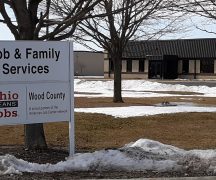By JAN LARSON McLAUGHLIN
BG Independent News
For decades, Wood County Job and Family Services has provided in-home care for low-income old and infirm residents. The value of those personal care and homemaker services was extolled last year as the agency promoted its tax levy.
The levy passed handily.
But now, months later, the agency is drastically cutting these services to older county citizens.
The purpose of the programs is to allow senior citizens to stay in their homes. The homemaker services provide cleaning for seniors unable to maintain a safe home. There were approximately 140 people in this program.
The personal care program provides bathing, nail care and medication set-ups to another 75 citizens.
“The programs are a safety net diverting people from institutions,” said Denise Niese, director of the Wood County Committee on Aging. Many of the people being removed from services by Wood County Job and Family Services are citizens also served by Niese’s agency.
“They are feeling abandoned,” Niese said.
Dave Wigent, director of Wood County Job and Family Services, agreed the letters sent out to seniors have raised concerns.
“We’ve got some frustrated people,” he said.
Wigent said the cutting of the services months after passage of the levy was unfortunate timing. But when his agency did a review of services in late November, it was discovered that Job and Family Services was getting reimbursed by the federal government for a small fraction of the cost of the program.
“Not only is it not mandated, it’s not funded,” Wigent said of the senior programs.
In 2017, the agency spent $900,000 on the homemaker program with its six employees, he said. At the same time, an evaluation showed that the bulk of the people receiving the non-mandated services had other options for the same care.
“We came to the realization we had a lot of people in the program who could take care of themselves, or had the resources to take care of themselves,” he said.
“We had some people we were cleaning their homes for 10 years,” Wigent said. “We just kept continuing it through the years because we thought it was a nice program.”
However, demands on Job and Family Services funding intensified last year for abused and neglected children and older adults. The agency has to prioritize those mandated services, Wigent said.
The number of cases in Adult Protective Services last year hit a record high 338 – 78 more than the year before.
“We’ve had an explosion of elder abuse reports,” he said. “My suspicion is that we will never see a reduction in the numbers.”
At the same time, the number of child abuse and neglect cases continues to increase. The cost for foster care last year jumped by $700,000, Wigent said.
“If that doesn’t level off, we’re going to be in a crisis.”
But others in the community feel that Job and Family Services is creating another crisis by discontinuing these long-standing programs.
“I don’t have a problem if an agency goes back and reassesses eligibility,” Niese said. “But to do an across the board elimination of a program after 30 years in service” is wrong.
The Wood County Committee on Aging is getting an earful from its clients about the cuts. The senior center nurse and social workers have received nearly 120 calls from seniors and their family members about the loss of services from Job and Family Services.
Wood County Administrator Andrew Kalmar said the problem was caused by the federal accounting system for the programs and the strict eligibility requirements being ignored by Job and Family Services.
“So the taxpayers were paying for those services” that in many cases the residents could afford themselves, Kalmar said. “It is certainly unfortunate that people have received services over time that they shouldn’t have been receiving.”
For those people who cannot afford the services themselves, efforts will be made to find other options, Kalmar said.
“The intent is not to randomly dismiss people from the program,” he said.
Sue Clanton, head of United Way of Wood County understood the decision to end the services.
“I know that JFS did this because of funding, and it was a very complicated decision,” she said.
However, Clanton said that finding other services to take the place of the homemaker and personal care programs will not be easy.
“It’s difficult to find services even to pay for,” she said. “I’m concerned, and I know there will probably be people who fall through the cracks.”
The Wood County Health District provided the personal care program with funding from Job and Family Services.
“We want to try to keep people in their homes as long as possible,” said Wood County Health Commissioner Ben Batey.
“People love our home health aides, so I can understand people being upset,” Batey said. “Change is hard.”
The health district may have to lay off some of its five staff members who work with the home health aide program.
Batey said he understood Job and Family Services is bound by mandates.
“Unfortunately sometimes hard decisions have to be made,” he said.
Many of the clients who cannot afford to hire their own services will be shifted to the Passport program, according to Wigent. Job and Family Services will help with the necessary paperwork, he said.
“The Passport program serves the most needy people,” Wigent said, estimating there are about 80 people left who meet the criteria of being infirm, low income or homebound.
However, there are some concerns about Passport being able to handle a large influx of new clients.
“On paper it makes sense and looks good,” Batey said. “The concern I have is that I don’t know Passports’ ability to take on all these people all at once. Hopefully no one falls through the cracks.”
Wigent said Job and Family Services may try to provide services in the interim if Passport can’t take all those in need.
“I am not aware of them having a waiting list right now, but I know they have in the past,” he said.
Niese is worried about the effect of the end of services so soon after the Job and Family Services levy touted the senior services. The bad public relations is likely to hurt those county agencies who go to the voters next for levy approval.
“It’s damaging to all agencies, but especially the health district and us,” Niese said.
Batey shared the concern.
“This wasn’t the health department’s decision,” he said. “We did everything in our power to take on the homemaker services ourselves. Hopefully people recognize these levies are important for the services we offer.”





